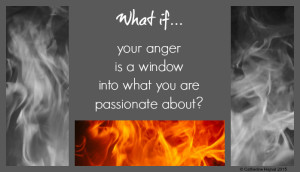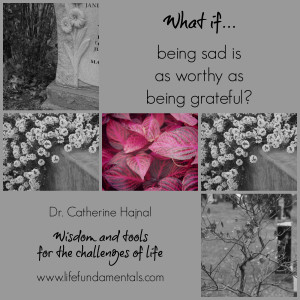I was reminded recently about the power of reframing. Reframing is when you tell a different story, a re-interpretation of some aspect or event in your life. Mine had to do with clearing out my storage locker. I have been wanting (and sort of not wanting) to make it happen for a few months now. I recently signed the piece of paper that says I’ll have the space clear for June 1. Signing was the way for me to “force” my hand – to create that deadline to move me into action. Here’s the general story I was telling:
I don’t want to deal with clearing out my storage locker. This going to be painful. How am I going to make this happen? This is going to be a hassle putting things online to sell, coordinating with people, meeting them at my storage locker, negotiating (if anybody even wants to buy anything), yeesh! Am I going to have to ask someone to help me? I can’t be in the locker and meeting someone at the entrance to the building at the same time. And what if I can’t get rid of anything? What will I do then? How I will get rid of what remains? It won’t fit in my car. I don’t want to just take it all to landfill. That’s not very considerate of the environment. I’ve got a deadline now. Why did I do that? Why didn’t I do a better job at getting rid of this stuff when I made my last move? I’ve been paying rent on this locker for a few months now – that’s money out the window given the low value of everything in it. I love some of that stuff. Part of me is really sad to see it go.
In the world of NVC, most of this would be labelled Jackal voice. The voice that is judgmental, critical, and generally not positive. Sometimes that voice speaks very loudly in my head. It brings me down. It zaps my energy to the point that sometimes I feel unable to muster up the motivation to even start a project. In this instance I was motivated because I’m trying to manage my budget differently right now and there was no way to justify what I was spending on the storage. It just didn’t make sense to hold on to the stuff for economic or sentimental reasons. Yet I was still having a hard time making this project happen.
Sometimes it is about taking one step. Getting a small “win” – trying something that is successful in its outcome. Small steps for me included getting into the storage locker and taking some pictures of things I wanted to sell along with some dimensions. I had a friend offer to help me with this so in the first round of picture taking I was supported. It ended up being another month’s worth of locker rental fees before I actually did something with those pictures, but having them in hand along with the support of a friend was a first step.
Then I started telling more friends about what I was trying to do – clear out my locker. I would tell them about what I had in there with the hopes that maybe a friend or two would take some of the stuff off my hands. That felt like it would be an easier way for it to unfold. Through that process I did pass on a few things. That meant I went to the locker a few times and some items actually came out. Another set of small steps.
With a few small steps under my belt I found some spaciousness over the whole thing. I was still in a grumbly frame of mind about it, but I also began to sense a light at the end of the tunnel. I began to feel like I might be able to make it happen. I knew I still needed a strong kick of something to really make me do it. For me that was signing the paper that said I would be out – and that my payments would be no more!
And then a friend came and took a few more things that created more spaciousness in the locker and in my sense of well-being. Yet another small step. With the literal space in the locker I was able to take more pictures and get the dimensions of some items. It was time to post the items online. Still resistance, but now a looming deadline.
I had tired to sell something on Craigslist a few months ago, and as I think about that, I realize it was one of my very first steps toward clearing out my storage locker. I wasn’t even selling something that was in storage at that time – it was something I had in my apartment – it served to help me see that I could sell something online and that it didn’t have to be too painful. Setting up the ad had been quick and kind of fun.
I took the next bold step of putting up a bunch of ads on Craigslist – descriptions, dimensions, and pictures of my goodies. I even chose to put some of the history – the sentiment – of the pieces in the ads, and I chose to acknowledge the pieces I was sad to see go.
Within about 15 minutes of placing the ads the first call came in. Metal garden ornament – “I’ll take it. Could we meet in about 45 minutes for the handoff?” More emails and phone calls on that one. It was gone already. In one of the phone calls the woman said she too had lived in the prairies (part of the sentiment I had included in my ad) and could see how the ornament would remind me of that. The man who made the first call and was the one who bought it off me was tickled pink to be buying it for his wife who was away. He knew she would enjoy it so it would be a surprise for her when she got home. He was recently retired and still figuring out what to do with his time.
And then the island/storage unit – the piece I was most worried about due to its size. It also had a lot of sentimental value, so was one of hardest for me to let go. A young couple were moving into a new apartment. They had recently finished school and were looking to furnish their new place. I enjoyed them so much I even threw in a carpet was I going to give to a thrift store.
“I sit on the sofa and work on my computer, but the coffee table is too low and it’s hurting my back. I think this desk with wheels will work well.” Off went the small yet functional metal desk.
Can you feel how my energy has shifted? My story started with this very negative voice. I’m currently in the energy of really enjoying this project. Sure, it has had some hassles. What I hadn’t appreciated was the really lovely people I might meet along the way. I haven’t had a lot of emails and phone calls, but I didn’t need to have a lot. Each of the people I spoken with bought something and each of them was delightful to connect with. Hmmmm – why didn’t I start with that story – a story of the possibility of fun, adventure, connection?
Here’s where the self-empathy part fits in. That jackal voice earlier was some fear talking. A lovely part of each of us – that fear voice that is there to keep us each safe. I was walking into uncharted territory. I’ve never had to clear out a storage locker before. Lots of unknown and uncertainty means my needs for control and clarity flare up – unmet in that moment. My need to appear competent – triggered by the voice of “What if I can’t make it work?” – was flaring up too.
I’ve been reminded of some lessons I’ve heard before and I guess I needed to hear and experience again.
The first is to take small steps. It is okay to be tentative, dipping in a big toe – trying something – without having to figure out it all out. This includes being gentle with self – with whatever approach I might need to take and to give myself time. Yes, sometimes things/projects will take longer than I want them to.
Second, when I’m in that negative, jackal voice, here’s a open invitation to try a different story, or at least play with the “What if…” story. What if the project could unfold with ease? What if I could have some fun? What if it could mean I meet some really interesting people? What if I could own being sad to see some of the stuff go and give myself permission to grieve? What if it is a bit scarey and that’s okay too?
I’m amazed at how different my reality has turned out to be from the story I first started with. I’m delighted to report the new story. I’m reminded of the power of story and how noticing my story and inviting a new one has the power to change what might be labelled a negative energy story into something very positive.
And finally I’m reminded of the power of sharing our stories. When we keep things bottled inside, it can often continue to feed our negative cycles. Even if the first story we are telling is a negative one, tell it any way. As I shared my story and began to get support with friends – those were the seeds of shifting my energy and being able to paint a new story.
What stories are you telling right now that aren’t feeling good? How might you be able to tell those stories a little differently? Start small – give yourself some permission to “What if…”. Give yourself permission to have a different story. Give yourself permission to find a story that feels better. Whatever your story, share it with your friends.
P.S. As of June 1, the storage locker is empty and I’m no longer making payments!
Text and Images Copyright © Dr. Catherine Hajnal 2011, 2012
 Wanting to find your passion for that next career, but not feeling it?
Wanting to find your passion for that next career, but not feeling it?
